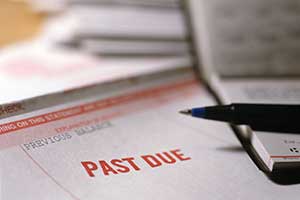
We may be past the worst days of the COVID-19 pandemic, but the financial hardships that it has caused for so many Ohioans continue. Debt collections after COVID-19 in Ohio are in full force for some. While some COVID-19 debt collection restrictions are still in place, others have subsided. If you are in debt and are facing creditors, know that you still have rights, options, and protections.
When dealing with debt collections, be sure to understand your options. Recovering from the financial hardships caused by the pandemic can take more than just a couple of years, and creditors need to understand that. Whether you’re looking for a loan modification after COVID-19 forbearance, hoping to find credit card debt relief, or even facing a debt collection lawsuit, be prepared and be informed.
Government Relief and COVID Debt Collection Restrictions
At the beginning of the COVID-19 pandemic, federal and state governments took action to help financially protect consumers. Some measures specifically targeted debt collection. In Ohio, legislation was introduced to halt all debt collections during the COVID-19 emergency. Lawsuits to collect debts, wage garnishments, evictions, and other debt-collection efforts were all planned to come to a halt.
On the federal level, the CARES Act resulted in stimulus checks delivered directly to most Americans. The American Rescue Plan Act later delivered another round of stimulus checks to Americans, expanded unemployment benefits, and introduced the Paycheck Protection Program to help small businesses pay employee wages.
Now, things are different.
While government support is still available for some consumers, many creditors have resumed debt collections. Collectors, it might be said, are also looking to get back to normal, and that means resuming collection activities.
Consumer Protections for Those in Debt
Debt collections after COVID-19 in Ohio are not part of the “normal” anyone was hoping to get back to. But if creditors are in pursuit of your debts, know that many of the same pre-pandemic rules and protections apply.
- Ohio Statute of Limitations on Debt – You are not necessarily protected from creditors just because your debt is old. However, the statute of limitations limits how much time creditors have to take legal action and file a debt-collection lawsuit. The statute begins from the date you stopped paying a debt. Under the statute, creditors have six years to take legal action on credit card debt, consumer loans, and student loan debt, among other types of debt.
- Contacting creditors – Know how to deal with debt collectors during the pandemic. When creditors call you or send letters, you may well be tempted to not respond. But calls and mail will likely continue. Instead of ignoring them, send a letter to the collector asking that they stop contacting you. This doesn’t mean that your debt will be forgotten, but it can give you time to regroup and come up with a financial strategy.
- The Fair Debt Collection Practices Act – Under the federal Fair Debt Collection Practices Act (FDCPA), consumers are protected from unsound debt collection practices. Debt collectors must refrain from abusive, deceptive, and dishonest collection efforts. In short, debt collectors should not and cannot harass you. This act applies to debt collections after COVID-19 in Ohio, just as it did before the pandemic.
Loan Modification after COVID Forbearance
You may be looking at a forbearance plan if you’re facing hardship and having difficulty making your mortgage payments. Perhaps you’ve already adopted a forbearance plan and now need to make payments on it. If this describes you, remember that you’re not alone; COVID-19 has disrupted countless Ohioans’ finances, and many are also seeking to avoid foreclosure.
Certain loan companies have issued COVID-19 payment deferrals that have extended forbearance plans by up to 12 months in some instances. However, once forbearance periods are over, which is the current reality for many Ohioans, monthly payments are once again coming due.
But financial hardships persist. So, consider learning more about a post-forbearance option that could mean the difference between a manageable monthly payment or facing debt collectors.
Loan Modification
Loan modification after COVID-19 forbearance changes your original loan terms. The modification makes your monthly payments and terms more manageable by lowering the monthly amount. In some cases, the interest rate or term of the loan may be modified. Some plans involve a trial period where you’ll be required to demonstrate that you can make agreed-upon monthly payments before the modification takes effect.
Repayment Plan
A repayment plan lets you repay a forbearance amount by making additional payments on top of your regular monthly mortgage payments. This plan lets you bring your mortgage back to its former state.
Refinancing
If you are already resolving your forbearance plan or have a plan to do so, you may be able to refinance your mortgage. Doing so could mean preventing debt collectors from pursuing you later on.
A Debt Collector Is Contacting Me. What Should I Do?
If a debt collector contacts you, don’t ignore them. But keep in mind that, legally, they cannot harass you. Further, you may even have a valid claim against the debt collector for violating fair practices.
Your Rights Concerning Debt Collection
Never forget that, even if you are in debt, you have rights. Even if your debt payments were on pause during the onset of the COVID-19 pandemic and have now resumed, your rights are still intact. The law provides certain protections for you. Under the FDCPA, debt collectors cannot pursue debt collection methods that include:
- Contacting or calling you at an inconvenient or inappropriate location or time, such as at your place of employment or after 9 p.m.
- Continuing to call you even after a collector has been made aware that you are unable to pay the debt or have legal representation
- Making threats, excessive calls and inquiries, or making false representations, such as a collector claiming that they’re an attorney
- Threats to publicize your debt or make your debt public knowledge
How to Respond to a Debt-Collection Lawsuit
Debts that were effectively paused as a result of the COVID-19 pandemic are now coming due. Some Ohioans have even received letters notifying them of a coming debt-collection lawsuit. If you’re one of these individuals, know how to respond. Ignoring your debt won’t make it go away. Instead, plan a strategic response as Step One of getting out of debt.
- Don’t be tempted to ignore these letters. Inaction could result in unfavorable outcomes, like a default judgment, whereby the creditor can pursue wage garnishments or other actions due to your not responding.
- Read the letter’s claims. You may find that the claims are unfair or inaccurate. Or you may find that the discussed debt is valid, but you need more time or help to begin repaying it.
- Respond to the letter. You have the right to ask for more information and for clarification as needed. Before responding, contact an Ohio debt collections attorney to help plan the best strategy and appropriate response.
Creditors and collectors can be intimidating. So, if you need help standing up to them and ensuring you’re taking the necessary steps, don’t hesitate to contact an experienced debt relief lawyer in Ohio.
Need Help Managing Your COVID Debt Relief Options? Call Us.
Even though the pandemic has produced little good news, some legislators have realized the importance of COVID-19 debt collection restrictions and similar consumer protections during an emergency. While it should not take an emergency to protect consumers from unsound debt collection and provide better relief, improved protections and consumer legislation may now be more likely.
If you need help right now with getting out of debt or stopping debt collectors, call us. Our dedicated debt-relief attorneys at Fesenmyer Cousino Weinzimmer know how to handle debt collectors and how to help if you’ve been experiencing harassment. Further, we’ll take a look at your financial situation to help chart the best course forward. Our debt-relief attorneys are compassionate, knowledgeable, and devoted to helping you reach financial freedom.
Let us help you deal with your debt. Call our attorneys at 614-228-4435 (Columbus), 937-222-7472 (Dayton), or 877-654-5297 (Cincinnati) today and ask for your free initial consultation.


